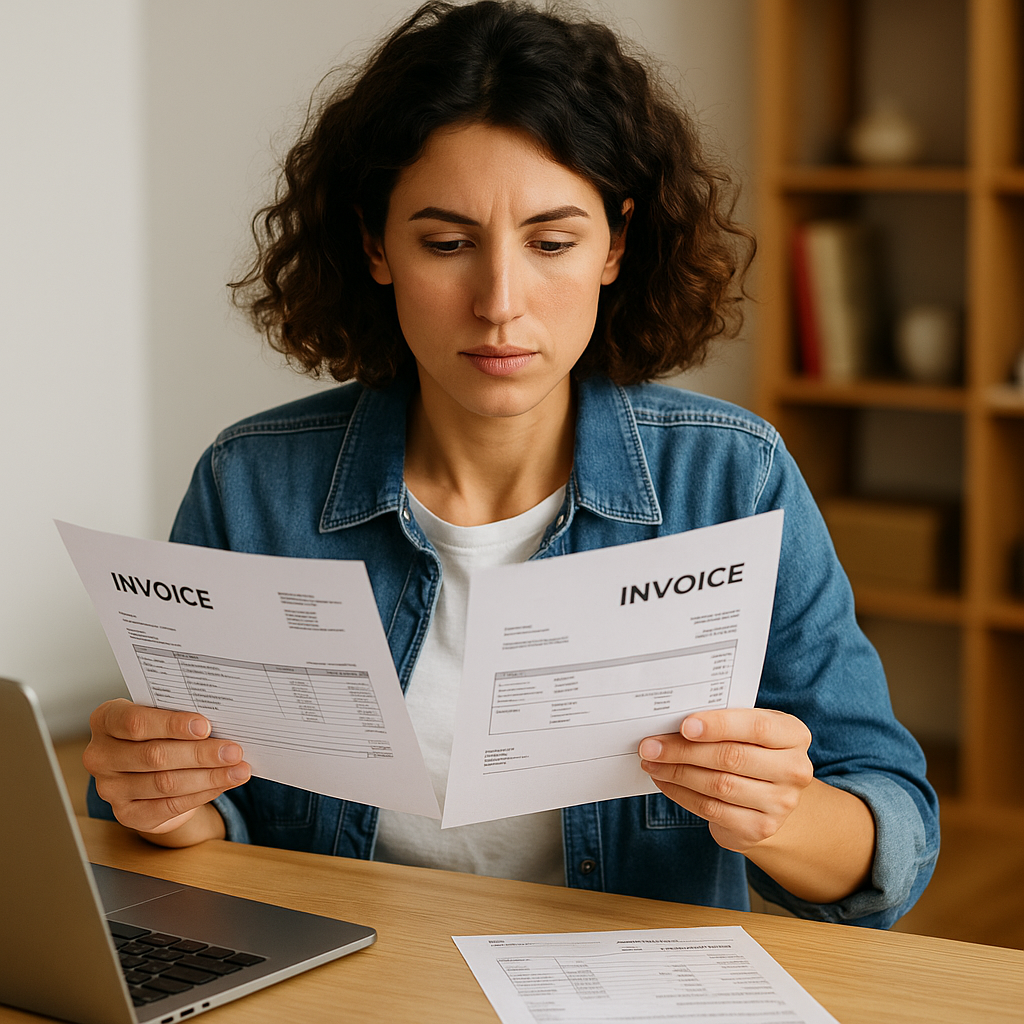Why Invoicing Correctly Matters
Invoicing is more than just sending a bill — it is a legal and financial record that protects you and ensures timely payments.A clear, compliant invoice strengthens your professional reputation, keeps your accounts organised, and helps you stay compliant with HMRC requirements.
For freelancers, incorrect or missing details can delay payments and even lead to rejected invoices. A properly formatted invoice, however, builds trust with clients and supports smooth bookkeeping and tax reporting.
What an Invoice Must Include (HMRC Legal Requirements)
Under UK law, every freelancer invoice must include specific information to be considered valid. HMRC requires the following details on all invoices:- A unique invoice number, following a sequential order
- Your name and trading name (if you use one)
- Your business address and contact information
- The client’s name and address
- A clear description of the goods or services supplied
- The invoice date and the supply date (if different)
- The total amount due and the currency used
- Payment terms — such as “Payment due within 14 days”
If you are VAT-registered, you must include:
- Your VAT registration number
- The VAT rate applied and the total VAT amount
- The net amount before VAT and total amount including VAT
Designing a Professional Freelancer Invoice
Your invoice should not only meet legal requirements but also look professional and be easy to understand. Consider the following best practices when creating your invoice:- Use consistent numbering — for example, INV001, INV002, and so on.
- Break down your services clearly, listing tasks, rates, and totals.
- Add your payment terms — including the due date, accepted payment methods, and any late payment policy.
- Include bank details or payment links for faster processing.
- Use your logo and brand colours to make it look polished and recognisable.
- Add notes if relevant, such as “Thank you for your business” or clarification about expenses or project milestones.
Invoicing International Clients
Many UK freelancers work with clients abroad, and invoicing them correctly is important for both professionalism and tax compliance.Here are key points to remember when issuing international invoices:
- Always state the currency (for example, GBP, EUR, or USD).
- Use a consistent exchange rate for conversions, such as the mid-market rate or HMRC’s official monthly rate.
- For EU clients, VAT rules may differ — if both parties are VAT-registered, you may apply the reverse charge mechanism, meaning VAT is not charged on the invoice.
- Clearly include your business address and VAT number if applicable.
- Ensure your chosen payment method supports international transfers and minimises currency conversion fees (for example, Wise or Revolut Business).
When to Send Your Invoice and How to Manage Payments
The timing of your invoice can significantly impact your cash flow.Freelancers typically issue invoices when:
- A project milestone has been completed
- The full project is finished
- At agreed intervals (for example, monthly or biweekly for ongoing work)
To reduce delays:
- Send invoices promptly after completing work
- Follow up with polite payment reminders
- Keep written records of payment agreements and email communications
What to Do If a Client Does Not Pay
Late or missing payments can be stressful. If a client does not pay by the due date:- Send a reminder — usually after three to five days.
- Follow up with a polite but firm message referencing the original invoice.
- If necessary, issue a final notice including a clear deadline and the possibility of charging interest.
- For persistent non-payment, consider debt recovery services or small claims court action.
Using Tools and Software to Simplify Invoicing
Modern accounting tools make invoicing faster, more accurate, and more professional.Some popular options for freelancers in the UK include:
- QuickBooks – integrates invoicing with expense tracking
- Xero – ideal for freelancers who need multi-currency support
- FreeAgent – widely used by UK contractors and self-employed professionals
- Zoho Invoice – offers automation and branding flexibility
- FreshBooks – user-friendly for tracking billable hours
Common Invoicing Mistakes to Avoid
Many freelancers make small but costly errors that delay payments or cause accounting problems.Avoid the following:
- Missing mandatory invoice details
- Forgetting to include a VAT number if registered
- Reusing invoice numbers
- Sending invoices without payment terms
- Failing to match invoice and supply dates
- Keeping poor records or not saving copies
FAQs
Do I need to include VAT on every invoice?Only if you are VAT-registered. If you are not, you must not include VAT on your invoices.
Can I send invoices by email?
Yes. Digital invoices are fully accepted by HMRC as long as they contain all required information.
How long should I keep my invoices?
At least six years from the end of the financial year they relate to.
Can I use my personal bank account for receiving payments?
It is better to use a separate business account for clarity, especially if you plan to claim expenses or register for VAT later.
Conclusion
Invoicing as a freelancer in the UK is not complicated once you understand what HMRC requires and follow a consistent process.A professional, compliant invoice ensures you get paid on time, simplifies your tax records, and reflects your reliability as a business owner.
At Persona Finance, we help freelancers streamline their invoicing, bookkeeping, and tax setup. Whether you need a legally compliant template or full accounting support, our experts are here to help.
👉 Book a free consultation with Persona Finance to simplify your freelancing finances and start getting paid faster.



